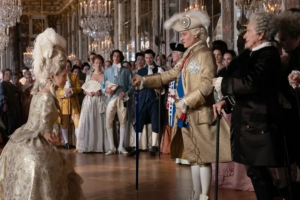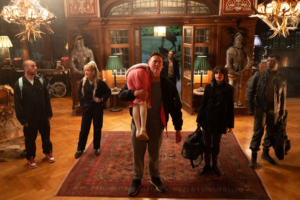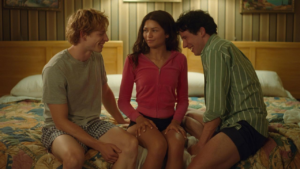Reviewed by GREG KING
Director: George Mendeluk
Stars: Max Irons, Samantha Barks, Barry Pepper, Terence Stamp, Tamer Hassan, Aneurin Barnard, Lucy Brown, William Beck, Richard Brake, Tom Austen, Gary Oliver.

After the overthrow of Nicholas II in 1918 the Russian peasants of the Ukraine thought they would be better off under the Bolsheviks. But it was not to be as the socialist ideal of collectivisation decreed that they had to cede a certain percentage of their harvest to feed the country. The peasants eventually rebelled against tis decree. Upset by their rebellion, Stalin (played by Game Of Thrones’ Gary Oliver) tried to ruthlessly crush this opposition and he demanded that the Ukrainians surrender 90% of their crops. It is estimated that between 7 and 10 million Ukrainian peasants died of starvation between 1932 and 1933 as Stalin ruthlessly enforced his genocidal program against them. Known as the Holodomor, this act of genocide is regarded as one of the worst crimes against humanity in the twentieth century. However, little was known about the Holodomor until after the fall of the Soviet Union in 1991. Such a cruel act cries out for a powerful howl of outrage such as Hotel Rwanda, which looked at the genocide in that country, but unfortunately Bitter Harvest comes across more like a muted cry and barely rises above the level of a telemovie.
The catastrophic events deserve a better screen telling than this rather melodramatic and lacklustre feature from German born writer/director George Mendeluk, who is better known for low brow comedies like 1986’s Meatballs III: Summer Job, etc. Mendeluk has worked extensively in television and his direction here is largely uninspired, uneven and flat. The dialogue is largely stilted and clichéd. However, the film looks good thanks to the beautiful cinematography of Doug Milsome (Robin Hood: Prince Of Thieves, etc). Bitter Harvest was largely filmed in Ukraine, which lends a certain authenticity to the locations and backdrop, but it lacks the epic sweep and grandeur of films like David Lean’s Doctor Zhivago.
The film itself can be seen as a contemporary rallying cry for the Ukrainian people against the aggressive stance of President Putin towards the country. This is a worthy and well-meaning film, and there is a good story to be found around this historical event, but this is not it. The story deserved a far more compelling and dramatic telling than this melodrama which places a rather insipid love story front and centre.
The film centres around Yuri (Max Irons, son of Oscar winner Jeremy Irons), who is the son of Yaroslav (Barry Pepper) and grandson of Ivan (Terence Stamp), legendary Ukrainian Cossacks. But rather than follow in their footsteps, Yuri is a more sensitive soul, an aspiring artist and poet who believes he can make a difference through art. He marries his childhood sweetheart Natalka (Samantha Barks, from Les Miserables, etc)) and relocates to Kiev to study art. But eventually a series of events force him to take up arms and return to his small village and become a hero of the resistance movement.
Irons makes for a rather weak and uninspiring, one-dimensional central character here. The love story between Yuri and Natalka detracts from the real drama of the fight against oppression and the cruelty of the Russian army. And the pair lack any real on-screen chemistry. Pepper and Stamp are largely wasted. Sergei (Tamer Hassan), the leader of the Russian troops is depicted as a one-dimensional villain who shoots priests and elderly peasants and beats women without so much as blinking. His actions are meant to inspire fear and hatred but come across as cartoonish at times.
★★☆



